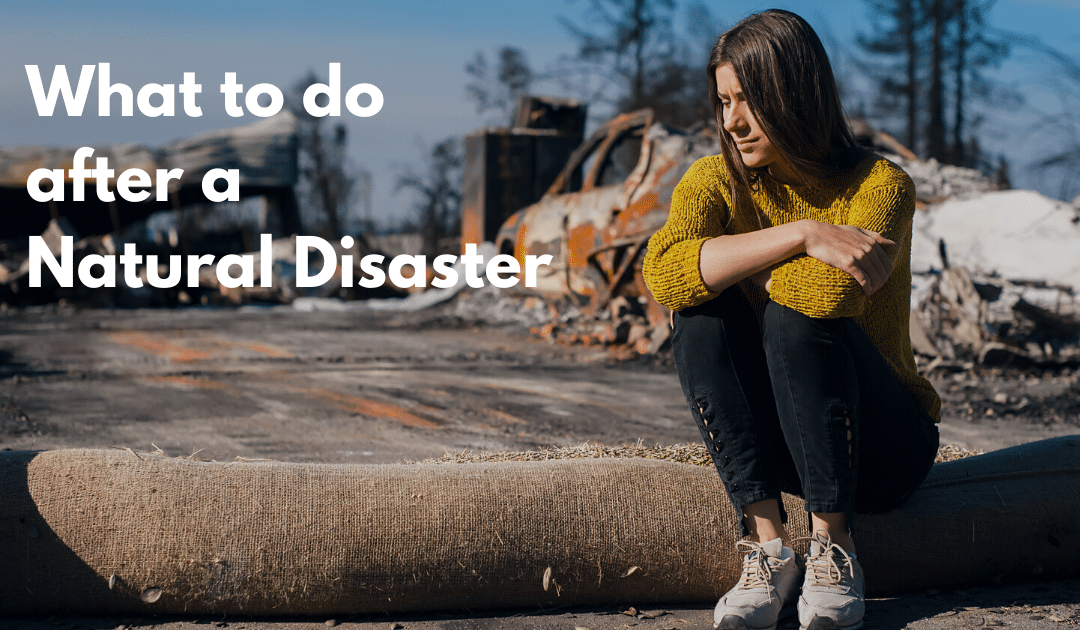Whether it’s a flood, tornado, hurricane or earthquake, a natural disaster can turn your world upside down in a matter of seconds. Besides stress, adrenaline, and fear, there may be injuries to deal with and damage or loss of property. Many people don’t know what to do in the wake of a disaster, which can hinder their coping efforts and recovery.
Here’s a list of the 6 main steps to take immediately following a natural disaster and in the days, weeks, and months that follow.
- Deal with the Immediate Aftermath
-
-
- Make sure all household members are accounted for. If anyone is missing, seek help from first responders.
- Attend to physical injuries or emotional distress. In cases of serious injury, summon professional help.
- If you and your family need to evacuate, follow your family’s evacuation plan, grabbing emergency kits, go bags, and essentials as assigned.
- Notify family and friends that you’re safe. If you can’t connect directly, you can register with FEMA’s emergency family locator online or by calling 1-800-588-9822. See more FCC & FEMA communication tips here.
- Be aware of any new safety issues created by the disaster, such as damaged roads/bridges, chemical spills, downed power lines, and washed-out roads. Inform local authorities if possible.
-
- Find Temporary Shelter or Housing
-
-
- If your home is damaged and rendered uninhabitable, take photos of the damage, remove any valuables you can, and secure the property. Call your insurance company as soon as you’re able.
- If you need to find an open emergency shelter near you right away, you can text SHELTER and your 5-digit zip code to 4FEMA. You can also use the FEMA Mobile App.
- gov also has shelter resources online.
- If you need to secure a hotel or other short-term housing, check FEMA’s resources for interim housing.
- Remember that COVID-19 safety and health precautions may still be in effect so be sure to protect yourself and your family and stay informed on general guidelines.
- If you have a pet, be sure to ask all sheltering or housing inquiries if pets are allowed.
- Keep all your receipts from temporary housing costs, as you can most likely submit them for reimbursement.
-
- Emergency Food and Water
-
-
- Listen to local radio or television to find disaster feeding sites.
- Check with local agencies, emergency shelters, and food banks for food assistance.
- If you have to boil or otherwise disinfect water, follow the proper guidelines.
-
- Seek Disaster Assistance
-
-
- Check local radio and media for information on housing, food, first aid, clothing, and financial assistance.
- The American Red Cross, Salvation Army, and other volunteer organizations also provide assistance, supplies and help with clean-up efforts.
- FEMA helps homeowners and renters who have lost their homes as a result of a presidentially-declared disaster. Assistance includes temporary housing, counseling, low-interest loans and grants, and other assistance. Register at gov or call 1-800-621-FEMA. You’ll need your:
-
- social security number
- telephone number
- insurance information, address (location of damaged home and current address)
- total household annual income
- routing and account number for bank account
- a description of damage and losses
-
-
- Returning Home
-
-
- Wait until your area is declared safe.
- If returning at night, use a flashlight to inspect your home and property. Keep an eye out for animals, including dangerous ones such as venomous snakes.
- Inspect the property and perimeter first, checking for hazards such as gas leaks, downed power lines, and structural damage. Do not enter if you smell gas, see floodwaters, or if there’s fire damage.
- If you do enter your home, you’ll need to be extremely cautious. Follow the dos and don’ts of inspecting your home in FEMA’s guide here.
-
- Replacing Lost Records & Protecting Your Property
-
-
- Ideally, your important records and financial documents were part of your emergency kit.
- If you need to replace records such as birth certificates, driver’s licenses, marriage certificates or social security cards, follow the instructions at USA.gov here.
- Contact your creditors to inform them of the situation and work with them for current and ongoing payments.
- If the disaster is a declared Federal disaster, you may be eligible for federal income tax deductions. Check with your tax planner.
- If a member of your family is injured and you’re caring for them, check with your employer to see if you’re eligible for the Family Medical Leave Act or disability benefits.
-
While checklists and logistical aspects all need to be dealt with, also keep in mind the mental toll that natural disasters exert. Seek help if you can, take breaks and walks, and practice self-care. Remember that children are especially affected. Community and support networks are especially important in times like these — lean on them when you need support, and offer help to others when you have some extra energy to give.
- Graduation – When to Remove Your Child from Your Auto Policy - May 18, 2023
- How to Prevent Catalytic Converter Theft - May 17, 2023
- How Much Does Home Insurance Cost? - May 17, 2023


We experienced a natural disaster, called the “Tunnel Forest Fire” starting April 18, 2022 through April 24, 2022. We were told by Department of Public Safety (DPS) & USFS to move out/evacuate from the affected areas. How do I file a disaster claims for expenses incurred due to this forest fire event?
Hi Josephine, we are so sorry to hear that you had to evacuate due to the wildfire, but we are glad that you are safe and ok. To file your claim you can go to https://www.calcas.com/claims or call 1.800.800.9410 and select option 4.
Please let us know if you need anything else during this time.
Thank you,
CalCas